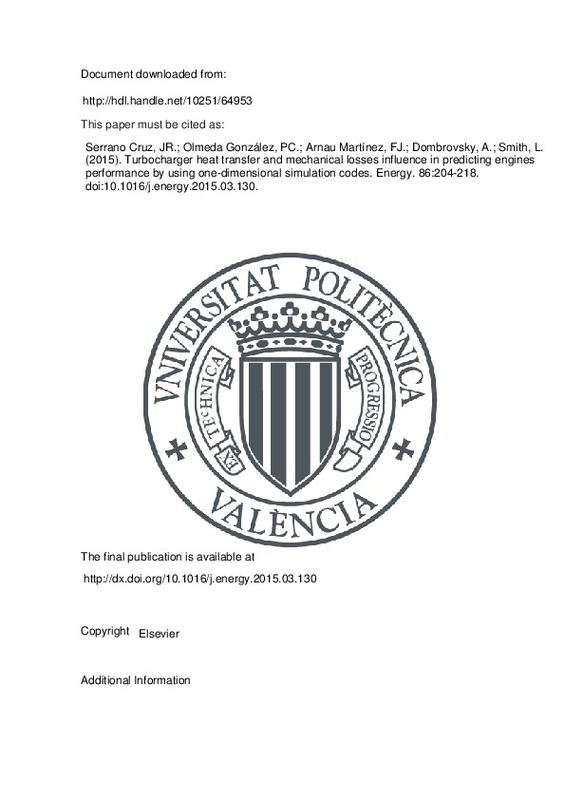JavaScript is disabled for your browser. Some features of this site may not work without it.
Buscar en RiuNet
Listar
Mi cuenta
Estadísticas
Ayuda RiuNet
Admin. UPV
Turbocharger heat transfer and mechanical losses influence in predicting engines performance by using one-dimensional simulation codes
Mostrar el registro sencillo del ítem
Ficheros en el ítem
| dc.contributor.author | Serrano Cruz, José Ramón
|
es_ES |
| dc.contributor.author | Olmeda González, Pablo Cesar
|
es_ES |
| dc.contributor.author | Arnau Martínez, Francisco José
|
es_ES |
| dc.contributor.author | Dombrovsky, Artem
|
es_ES |
| dc.contributor.author | Smith, Les
|
es_ES |
| dc.date.accessioned | 2016-05-30T14:53:37Z | |
| dc.date.available | 2016-05-30T14:53:37Z | |
| dc.date.issued | 2015-06-15 | |
| dc.identifier.issn | 0360-5442 | |
| dc.identifier.uri | http://hdl.handle.net/10251/64953 | |
| dc.description.abstract | The exhaust energy can represent up to 40% of the fuel chemical energy in turbocharged internal combustion engines. In order to calculate properly the available energy of the exhaust gases, a critical parameter is the temperature downstream the turbine. The prediction of this temperature will also benefit the two-stage turbochargers and after-treatment modelling that affects brake specific fuel consumption, exhaust gases emissions and the scavenging process. In this paper, turbocharger heat transfer losses have been modelled using a lumped capacitance model coupled with one-dimensional whole-engine simulation software. The data from the simulations of a turbocharged Diesel engine, with and without the turbocharger heat transfer model, have been compared with experimental measurements performed in an engine test bench. The analysis is focused on studying the influence in turbocharger outlet temperatures and predicting the engine performance. The main result of the study is the improvement in the prediction of both compressor and turbine outlet temperatures (up to an improvement of 70 K). The results from the model allow analysing how heat transfer losses are split in the turbocharger and quantifying the importance of heat transfer phenomena in turbocharger efficiency, at full load conditions and as a function of engine speed. | es_ES |
| dc.description.sponsorship | This work has been financial supported by Jaguar Land Rover Ltd. It has been also partially supported by Ministerio de Economia y Competitividad, Secretaria de Estado de Investigacion, Subdireccion de proyectos de investigacion (TRA2013-40853-R). | en_EN |
| dc.language | Inglés | es_ES |
| dc.publisher | Elsevier | es_ES |
| dc.relation.ispartof | Energy | es_ES |
| dc.rights | Reconocimiento - No comercial - Sin obra derivada (by-nc-nd) | es_ES |
| dc.subject | Internal combustion engine | es_ES |
| dc.subject | Turbocharger | es_ES |
| dc.subject | Heat transfer | es_ES |
| dc.subject | One-dimensional model | es_ES |
| dc.subject.classification | MAQUINAS Y MOTORES TERMICOS | es_ES |
| dc.title | Turbocharger heat transfer and mechanical losses influence in predicting engines performance by using one-dimensional simulation codes | es_ES |
| dc.type | Artículo | es_ES |
| dc.identifier.doi | 10.1016/j.energy.2015.03.130 | |
| dc.relation.projectID | info:eu-repo/grantAgreement/MINECO//TRA2013-40853-R/ES/DESARROLLO DE NUEVAS TECNICAS DE LIMITACION DE LA PERDIDA DE PRESION EN DPFS PARA REDUCIR LAS EMISIONES Y EL CONSUMO DE LOS MOTORES DIESEL/ | es_ES |
| dc.rights.accessRights | Abierto | es_ES |
| dc.contributor.affiliation | Universitat Politècnica de València. Instituto Universitario CMT-Motores Térmicos - Institut Universitari CMT-Motors Tèrmics | es_ES |
| dc.contributor.affiliation | Universitat Politècnica de València. Departamento de Máquinas y Motores Térmicos - Departament de Màquines i Motors Tèrmics | es_ES |
| dc.description.bibliographicCitation | Serrano Cruz, JR.; Olmeda González, PC.; Arnau Martínez, FJ.; Dombrovsky, A.; Smith, L. (2015). Turbocharger heat transfer and mechanical losses influence in predicting engines performance by using one-dimensional simulation codes. Energy. 86:204-218. https://doi.org/10.1016/j.energy.2015.03.130 | es_ES |
| dc.description.accrualMethod | S | es_ES |
| dc.relation.publisherversion | http://dx.doi.org/10.1016/j.energy.2015.03.130 | es_ES |
| dc.description.upvformatpinicio | 204 | es_ES |
| dc.description.upvformatpfin | 218 | es_ES |
| dc.type.version | info:eu-repo/semantics/publishedVersion | es_ES |
| dc.description.volume | 86 | es_ES |
| dc.relation.senia | 299796 | es_ES |
| dc.identifier.eissn | 1873-6785 | |
| dc.contributor.funder | Ministerio de Economía y Competitividad | es_ES |
| dc.contributor.funder | Jaguar Land Rover Limited | es_ES |







![[Cerrado]](/themes/UPV/images/candado.png)

